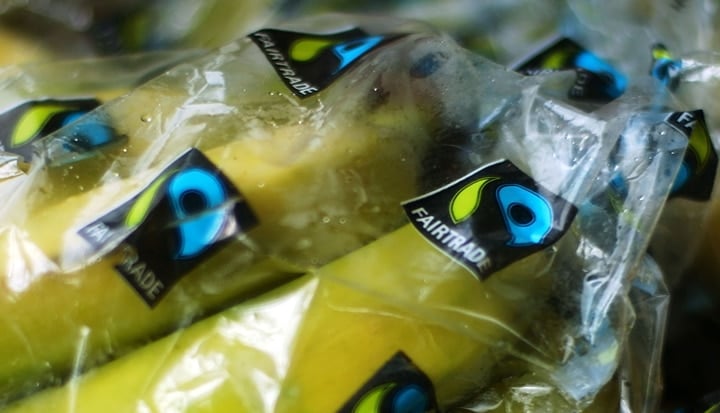To mark Fairtrade Fortnight and the Make Bananas Fair campaign. Michael Gidney, CEO of the Fairtrade Foundation, explains why we need to make sure all bananas are sourced fairly and ethically in the UK.
I have just come back from visiting banana producers in Colombia. Along the humid tropical coast bananas seem to be everywhere – we travelled miles along bumpy roads lined with dense banana fields. But what has stayed with me most is just how challenging banana farming is. This is a crop that grows profusely, in many regions across the world, and so it is tempting to think a banana farmer’s life is an easy one. In fact, bananas are very vulnerable plants, highly susceptible to infection, poor drainage and wind damage. In these regions pests, tropical storms and strong winds are a fact of life. Banana farmers struggle to make ends meet in such difficult conditions.
Back home in the UK, I am struck by the contradictions in our attitude to bananas. It is our favourite fruit – British people eat 13 million of them every day. It is the most bought fruit in supermarkets and has a place in millions of lunchboxes and kitchens across the country. And yet the price we pay for our bananas has nearly halved over the last 10 years. We now pay so little for our bananas that some farmers are being forced to give up producing bananas. Others receive less than the costs of production and are trapped in a cycle of poverty. How can we in the UK love something so much and value it so little?
This is not just another quirk in the public’s relationship with supermarkets. The fact is that cheap prices in the UK threaten farmers’ futures, making it harder for farmers and workers at the other end of the supply chain – in Latin America, the Caribbean and Africa – to survive. While we have been paying less and less for our bananas, costs for farmers have increased. In Colombia, for example, costs of production have gone up by 85 per cent over the last decade. This squeeze is unsustainable and that is why this Fairtrade Fortnight we are launching a campaign to make bananas fair.
The problem is made worse by aggressive price wars, driven by supermarkets, which drive banana prices down. Farmers need to increase their prices to cover costs and to be able to invest in their futures, but this is virtually impossible when the dominant culture in the banana trade is to push prices lower.
Fairtrade provides a shield that farmers can use to defend themselves from some of the consequences of these price wars. They earn a guaranteed Fairtrade Minimum Price plus an additional social premium, which they invest in their farms and their communities. This has brought real benefits: farmers have improved the efficiency and productivity of their farms while also investing in health centres, better housing and education.
During my visit to Colombia I was invited to open a new school that producers had funded from Fairtrade Premiums, in a very poor part of the country where previously children had been taught in a pig-sty, sheltering from the sun alongside the pigs. In fact, 14 different Fairtrade producer groups had come together to build this school and so it really is a very broad community effort and will transform the way children are schooled in the area.
But we need sector-wide change to enable more banana producers to benefit from their trade. The disgraceful fact is that too many farmers remain poor – half the world’s hungry are farmers. Fairtrade is proof that it doesn’t need to be like this. Some supermarkets boast that they always act in the interests of consumers. The popularity of Fairtrade suggests that this is not always correct. There cannot be many people who want families in developing countries to pay the price of cheap bananas in the UK.
This is a race to the bottom and it must end before we can see fairness and justice in the banana trade. With supermarkets locked into regular price wars, in which banana farmers and their families are the collateral damage, we cannot expect the market alone to solve the problem. This market failure will need government intervention and that is why we are calling on the government to intervene, to investigate the impact that banana pricing is having on producers and on the banana market, and to take action to make bananas fair.
The response of the supermarkets has been mixed. We are publishing a scorecard this week, which shows how seriously the retailers are taking their responsibilities towards banana farmers. We commissioned Ethical Consumer to assess the supermarkets’ banana sourcing in four key areas: social, environmental, economic and transparency. Its analysis is that everyone has further to go, but the supermarkets who are performing best are those – like Sainsbury’s, Waitrose and The Co-operative that have committed to source 100 per cent of their bananas on Fairtrade terms. So yes we need government action to solve the problem in the long term, but there is also a choice that each of us can make when we next buy bananas. Each Fairtrade banana you buy is a signal to the supermarkets that we value our food, we value the people who grow it and that we expect supermarkets to value them too.
Download Report: Britain’s Bruising Banana Wars – Why Cheap Bananas Threaten Farmers Futures










